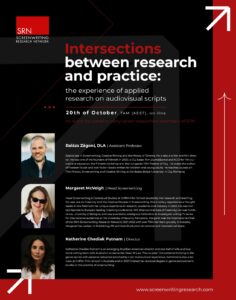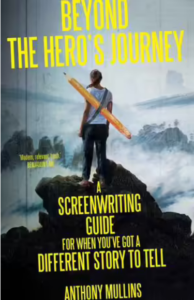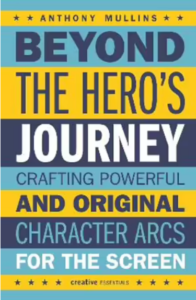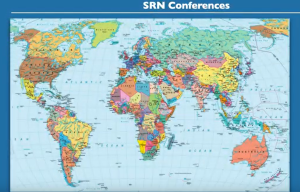Thank you so much to our long-standing member Paolo Russo for continuing to prepare these for us. : )
Conferences
16th Annual SRN Conference, September 2024 – Olomouc, Czech Republic
The central theme for the 16th Annual SRN Conference in 2024 is
“A Conversation Beyond Script”
Through this theme we seek to encourage a broad exploration of dialogue and communication within the world of screenwriting and beyond. Although we emphasize the role of dialogue, monologues and polylogues in scripts, films and television, we also invite you to interpret this theme metaphorically, considering filmmakers’ discussions amongst cast and crew, amongst cultures, and other related topics.
Call for Papers – SRN Conference 2024
We accept the following:
Traditional 20-Minute Papers
(Proposal should include: Title, Author’s name, Affiliation, Contact details, 300 word abstract, 4-6 keywords, 150 word bio)
Pre-constituted Panels
(Proposal should include: Title of the panel, 100 word outline of the overall topic, Abstracts of 2-3 presentations following the abstract guidelines listed above).
Posters
(Proposal should include: Title, Author’s name, Affiliation, Contact details,300 word abstract, 4-6 keywords, 150 word bio)
Please send your proposals to srn2024@upol.cz
Submission Deadline: January 12, 2024. Always wait for confirmation that your proposal is registered.
For further enquiries, contact the Conference organizers: Jan Černík, Anna Šimáková, Filip Faja
Details and further information about the conference will be available online as the conference draws nearer.
The Conference website has been active since November 2023. Access it here.
SRN Early Career Researcher Event

To be sent the Zoom link, please contact Clarissa Miranda on miranda.clarissa@gmail.com
SRN Conference 2023 – Columbia, Missouri, USA
The 15th International Screenwriting Research Network Conference is to take place in Columbia, Missouri, from 20th – 23rd September 2023. More information can be accessed here:
SRN Awards 2022
Presented at the Vienna Conference on Friday 23rd September 2022
The SRN Awards apply to eligible publications between June 2021 and May 2022 in two categories: Best Published Monograph, and Best Published Article. This includes peer-reviewed journal articles and book chapters. The Executive Council has worked throughout the year to consolidate the process by liaising with the expert jury, Professor Emeritus Tom Stempel, Associate Professor Eva Novrup Redvall, and Professor Carmen Sofia Brenes. The SRN 2022 Awards winners were announced at the Vienna Conference by jury chair, Eva Novrup Redvall.
The SRN award for Best Monograph went to s. Anthony Mullins for his book Beyond the Hero’s Journey


The SRN award for Best Published Article went to Alison Pierce for “The Hidden Work of Women in Commissioning and Development in British Television Drama.”.
The SRN Executive Council would like to thank our judges for their time and commitment in reading all the submissions to come to these conclusions. We also want to thank all SRN members who submitted their published works to the competition. It is always an achievement to complete and article or book and have it published.
And of course, we offer the warmest congratulations to our winners, Anthony Mullins and Alison Pierce, for their outstanding works. We know they will be valuable for years to come to scholars and practitioners alike.
SRN 2023 Columbia, Missouri USA- Conference Call for Papers
CALL FOR PAPERS
SRN 2023: GENDER AND THE FEMALE GAZE
September 20-23, 2023
The SRN (Screenwriting Research Network) is comprised of scholars, writers, and practice-based researchers. Started in 2006, the network currently has 700 members from 50+ countries. The aim of the annual International Conference is to continue, and expand, discussions around the screenplay and to strengthen a rapidly emerging, and global, research network. For more Information, please visit our website: http://screenwritingresearch.com
The 15th annual conference is organized by the Stephens College MFA in TV and Screenwriting and the School of Integrative Studies at Stephens College. The arts and humanities thrive in Columbia, Missouri, as dozens of on- and off-campus performances occur year-round at
Stephens, making the College one of Columbia’s premier centers for the performing arts.
Call for Papers:
Coming from a host college that focuses on female participation in the arts, the conference theme “Gender and the Female Gaze” wants to discuss the contributions of female screenwriters and the plethora of female-focused stories told on screen from the Silent Era through the modern day. We encourage and embrace research that is around women of different ethnicities, religious and cultural backgrounds, and particularly hope to engage topics which relate to minority cultures within minority (and majority) communities. We are thus particularly interested in abstracts for presentations on (but not limited to) the following topics:
• Female screenwriters in silent cinema
• The influence of female writer(-directors) in contemporary culture
• Case studies on individual female screenwriter’s work
• Patterns in the women-centred stories that have been brought to the screen
• Historiography of manuals and screenwriting pedagogy where this reflects the work of female screenwriters
• Censorship of women’s stories and women’s writings
• Female screenwriters within writing partnerships
• The work of female screenwriters within script production (e.g. as showrunners, script editors or consultants)
• The question of a female voice within screenwriting
• The cultural influence of female characters created by female screenwriters
• The way life experiences led to the story told
• The challenges to their projects screenwriters often meet which speak to political, religious, gender or other barriers which may not apply to their male counterparts.
• The real-world impact of the script on its audiences and society.
• Examples of the ways women stepped out of traditional roles to work for change and an improved future for themselves and their communities through screenwriting.
• How female screen stories tackled issues of culture, religion, identity, gender and race
• How women have negotiated screen industry norms and practices, biases and social hurdles in order to tell their screen stories.
• Ways in which the professional woman’s everyday life (e.g. romance, marriage, parenthood status or citizenship) has been challenged or made more challenging because of her professional work, and vice versa.
• Issues caused by unreliable narrators of history
• Studies of cultural appropriation in screenwriting; cultural imperialism; cultural disconnect and/or discord which comes about through discourses of power
• Research into the ways in which money/ finance precludes certain stories from being told, even by successful screenwriters
Proposals for presentations beyond the theme of the conference are also welcome. The aim of the SRN being to foster research that rethinks the screenplay in relation to its histories, theories, values and creative practices, any proposal underpinned by such research will be considered. We expect papers on the broad topics of pedagogy, theory and practice – but even those may reflect the conference theme via the choices of writers chosen for inclusion in the study.
–
Essential Information:
Deadline for abstracts: January 6, 2023
Acceptances: February 15th, 2023
Registration by: June 30, 2023
Submissions via email and contact:
Rosanne Welch
rwelch@stephens.edu
Submission of abstracts/proposals
Proposals/Abstracts can be sent as either a Word or PDF document: please indicate
“yourname_PROPOSALTYPE” (i.e. paper or panel) clearly in the file title and in the subject heading of your submission.
All presentations will be delivered in person, in English, and be underpinned by original research work being conducted by the presenter. Multiple presenters (max. 2) for co-written papers are allowed.
1.) Proposals for traditional 20-minute papers, followed by Q&A. They should include:
Title
Author’s name
Affiliation (university, independent, practitioner, etc.)
Contact details
Abstract (max. 300 words)
4-6 keywords
short bio (max 150 words), detailing your research activity, publications and/or screenwriting practice – and if the piece contributes to the conference theme please note.
2.) Proposals for Pre-constituted panels
Proposals for pre-constituted panels can be submitted by any of the presenters or the Chair of the panel and should include:
title of the panel
brief outline (100 words maximum) of the overall topic
abstracts of all the presentations – no more than 3 papers – following abstract guidelines listed above.
Abstracts should follow the guidelines for individual papers as above and include short bios and contact details of both the speakers and the panel Chair. Wherever possible, the Chair should NOT be one of the presenters. If a proposal for a pre-constituted panel does not include a Chair, the Conference Committee will appoint one. All proposals should indicate “Panel Proposal SRN 2022 in the file title and in the subject heading of the submission email.
Website and registration
The Website for the conference will include a wealth of useful information (e.g., registration, travel arrangements, accommodation options), as well as all the updates and the program leading up to the Conference. It will go live in early December.
The conference fee is expected to be in the region of $120 USC /100 Euro.
SRN Conversations #2 is now online!
In this video, JJ Murphy, Kathryn Millard and Alex Munt talk to Rosanne Welch about the SRN conferences they organized in Sydney (Australia) in 2012 and Madison, Wisconsin (USA) in 2013.
This is the living memory of the Screenwriting Research Network.
SRN 2022 Vienna – Conference Call for Papers
Call for Papers
14th Screenwriting Research Network International Conference:
Globalizing Screenwriting
22nd-24th September 2022
Department of Theatre, Film and Media Studies, University of Vienna, Vienna, Austria
UZA II-Rotunde, Althanstraße 14, 1090 Wien
Film Academy Vienna,
Anton-von-Webern-Platz 1, 1030 Wien
Essential Information:
Deadline for abstracts: 15th December 2021
Shortlisting/notification of acceptance by: End of January 2022
Early-bird registration: From early March until end of May 2022
Regular registration by: Mid-July 2022
Late registration by: End of August 2022
Submissions via email and contact: stephanie.schwarz@univie.ac.at
Call for Papers:
The SRN is comprised of scholars, writers, and practice-based researchers. Started in 2006, the network has achieved a substantial critical mass over the years – currently counting 700 members from 50+ countries.
The aim of the annual International Conference is to continue, and expand, discussions around the screenplay and to strengthen a rapidly emerging, and global, research network. So far, they have taken place in Leeds (2008), Helsinki (2009), Copenhagen (2010), Brussels (2011), Sydney (2012), Madison-Wisconsin (2013), Potsdam-Babelsberg (2014), London (2015), Leeds (2016), Dunedin (2017), Milan (2018) and Porto (2019) and due to pandemic online, organized by Oxford Brookes in 2021.
Submission of abstracts/proposals
Proposals/Abstracts can be sent as either a Word or PDF document: please indicate “yourname_PROPOSALTYPE” (i.e. paper, panel, or videoessay; see below) clearly in the file title and in the subject heading of your submission.
Format of presentations/abstracts
After the cancelling of the 2020 conference and the online seminar series we are planning a face-to face conference, the first since Porto 2019.
All presentations, regardless of format, must therefore be delivered in person (i.e. no pre-recorded presentations), in English, and be underpinned by original research work being conducted by the presenter (i.e. no recycling/repetitions from previous SRN or other conferences). Multiple presenters (max. 2) for co-written papers are allowed.
We accept proposals for presentations in the following formats:
Individual papers
Proposals for traditional 20-minute papers, followed by Q&A. They should include:
- Title
- Author’s name
- Affiliation (university, independent, practitioner, etc.)
- Contact details
- Abstract (max. 300 words)
- 4-6 keywords
- short bio (max 150 words), detailing your research activity, publications and/or screenwriting practice.
Pre-constituted panels
individual papers + Q&A (as per guidelines above) on a shared topic. Proposals for pre-constituted panels can be submitted by any of the presenters or the Chair of the
panel and should include:
- title of the panel
- brief outline (100 words maximum) of the overall topic
- abstracts of all the presentations – no more than 3 papers.
Abstracts should follow the guidelines for individual papers as above and include short bios and contact details of both the speakers and the panel Chair. Wherever possible, the Chair should NOT be one of the presenters. If a proposal for a pre-constituted panel does not include a Chair, the Conference Committee will appoint one. All proposals should indicate “Panel Proposal SRN 2022 in the file title and in the subject heading of the submission email.
Audiovisual essays
Proposals are invited to present an audiovisual essay of 15 minutes maximum, in which the presenter(s) express a position on one of the above topics. It should NOT be a recording of a traditional paper presentation nor an experimental film; rather, it is an audiovisual discourse on a theoretical position. Essays can be submitted both individually or in panels of 3 videos grouped thematically (see guidelines above).
Note: the presence of the presenter at the conference is required.
Shortlisting
We warmly recommend that the abstracts be as well-drafted as possible with a well-
defined research question, a clear focus, and a short summary of the intended
content of the presentation at the time of submission.
We aim to notify acceptance/rejection of proposals by the end of January 2022.
Website and registration
The Website for the Vienna conference will include a wealth of useful information (e.g., registration, travel arrangements, accommodation options, Covid rules), as well as all the updates and the program leading up to the Conference.
Registration will have the usual phased deadlines (early-bird, regular, late-premium, student concession); the conference fee is expected to be in the region of 100 Euro.
Contacts
Please address any query regarding abstracts, registration, program, etc. to claus.tieber@univie.ac.at or stephanie.schwarz@univie.ac.at
- Claus Tieber University of Vienna, FWF-Project (Organizer)
- Stephanie Schwarz University of Vienna, FWF-Project (Co-Organizer)
- Claudia Walkensteiner-Preschl, Film Academy Vienna (Co-Organizer)
Department of Theatre, Film and Media Studies, University of Vienna
UZA II-Rotunde, Althanstraße 14, 1090 Wien
Film Academy Vienna
Anton-von-Webern-Platz 1, 1030 Wien
The website for the SRN2021 Research Seminar Series Online is now LIVE… and kicking!
That’s right! The wait is over, the whole event has finally taken shape and as of today you can start accessing all content and information via the website at srn2020.com (I know, but changing the domain name meant additional costs, and if sport events can keep the original 2020 name, why shouldn’t we at least in the URL).
Let’s get to business! The first thing everyone should do is register to SRN2021. Registration is FREE but “required” for everyone – speakers and regular attendees alike. This is because, among other things, while a good wealth of information is freely accessible anyway, the core content of SRN2021 – namely, pre-recorded video-presentations of papers, live panels and related recordings – will only be accessible via password, which you will receive when you register. To register, simply fill in and submit the form that applies to you (speaker or attendee) on the website. Registered delegates will also receive the login details (i.e. link, session ID and password) for all the live panels’ sessions (these will be sent out as invitations around mid-late August).
Then you can take a look at the schedule for the Live panels to get an idea of the incredible amount, variety and originality of the research being presented by our panelists this year. Despite everything that is going on, we still have 20 panels and 76 papers in our line-up. More about this in a minute.
As you all know, SRN2021 Online replaces (or, at least, will do its best to try) our Annual Conference, which had to be cancelled. Switching online meant having to adjust to the unusual format but also gives us the opportunity to make the most out of what it offers. Therefore, the SRN2021 experience is not limited to the “live” sessions: it starts before (essentially, NOW) and it continues afterwards, with the website as your central control hub for everything – as easy as 1, 2, 3!
1) PRE-RECORDED PRESENTATIONS: all speakers have been asked to submit their papers as pre-recorded 15’ video-presentations; they will then attend their respective live Q&A panels in a few weeks’ time. Given the number of papers, the best approach is to watch as many presentations as possible ahead of the live sessions so as to be able to make an active contribution to those. On the website you can find all the abstracts and bios, and you can easily access (via password) all the presentations. A dozen or so are already online (many thanks to those of you who submitted early!) and most other submissions are expected in the next week or two – I will upload them on the website on a daily basis.
2) LIVE PANELS: bookmark the dates on your calendars if you haven’t done so already. We kick off on Tuesday 31 August, then continue in September, on Friday 3, Wednesday 8, Monday 13 and Friday 17. The full schedule is available as a PDF document: the reference time zone is UTC/GMT (i.e. UK time), but you will find downloadable versions for all time zones (at least those of our speakers). And you can also access the programme for each individual day. The schedule is now pretty much final although some tweaks might still occur.
As per previous emails, on each day we will have two sessions so as to give delegates from all geographic areas a chance to attend at least one (colleagues from Europe can easily attend both). Unless you turn into owls you will probably miss a few sessions when it’s night time in your country: not to worry because we will record all of them and make them available ASAP as catch-up via the website. However, please please please do try and attend as many as reasonably possible: we do need lively panels to make this work. And remember that, on top of the regular panels’ Q&As, the live sessions also include the two keynotes, the AGM, the EC Elections, a round table, the SRN Awards, the Working Groups, plus time to network with colleagues. Again, info on all of these are available on the website.
Q&As: each panel will last on average 45 minutes (a little longer if it’s a panel of five). How to ask questions to our speakers? During the live session you can ask questions either in person or via chat (the chair/host will moderate these). But you can also submit your comments/questions on the website when you watch the presentations; in this case, the relevant chairs will collect them and forward them to the speakers during the live panels.
3) The AFTERPARTY: I am planning to organize a few extra one-off events with special guests (I’m still working on this though). If things go to plan these will be in late September/October/early November. These will likely be informal chats with writers and/or producers, and/or workshops with colleagues, and/or more ad-hoc networking sessions to foster collaborations with SRN colleagues. Plus, last but not least by any means, in November we will have the ECR Symposium organized by Ann Igelström – you can find the details to submit your proposals on the website (as well as on the SRN website). The deadline is 10 August, so hurry up! And yes, if you are an Early Career Researcher you can submit to the Symposium even if you are already participating in SRN2021 (with a different paper, though).
Specific dates and events aside, the website (and all its content) will remain available to all registered delegates for the next two years, thus giving all of you plenty of time to check out research strands you might be interested in and get in touch with colleagues for potential future collaborations.
As you can see, there’s enough on the website to get you going for a long time so better get started straight away, right? I have done my best to redesign it and hopefully you will be able to navigate it as smoothly as possible: however, if you spot any errors, or bump into anything that doesn’t seem to be working properly, do give me a shout and I will try to fix it. For instance, I tried to optimize the website so it can be accessed from computers, tablets and phones, but it looks like older devices might have some issues displaying some content.
You will notice a few pages on the website still marked as “Coming soon”. These are still under construction and will become available within the next few days. One of these, for instance, will allow you to search for content in different ways based on your interests. If you are not familiar with Zoom (the videoconferencing platform we will be using for our live sessions) you will soon find guidance and tips on the website. Or, again, the specific pages for individual days of the live panels. I will send out weekly updates from now on, each one focusing on a few specific things in the lead-up to the live sessions.
One final reminder: on Day 4 (13 September) we will hold our AGM and the elections of three new members of the Executive Council of the SRN. Please consider standing for election: the call for nominations was issued last month, is available on the SRN website here, and you will soon find the relevant info on the SRN2021 website as well. The deadline to submit your nominations is 16 August and we will set up a secure online voting system in the forthcoming days.
This is it for today.
Do explore the website, register right away, get watching the presentations, mark the dates on your calendar and start enjoying SRN2021!

